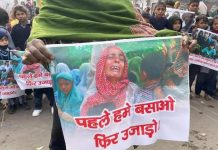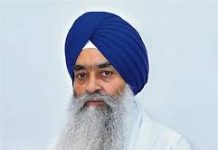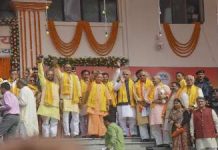 On the literary giant, Saadat Hasan Manto’s upcoming 108th birth anniversary on May 11, shouldn’t the Punjab government host a series of programs saluting this genius writer. After all, he was born in Ludhiana, on May 11, 1912.
On the literary giant, Saadat Hasan Manto’s upcoming 108th birth anniversary on May 11, shouldn’t the Punjab government host a series of programs saluting this genius writer. After all, he was born in Ludhiana, on May 11, 1912.
In fact, each year around May 11 — the day Saadat Hasan Manto was born — I sit introspecting, what would he have written if he was alive today, in the midst of today’s turbulent trying times. Of course, he would have been provoked to write many more short and long stories focusing on the horrifying human situation of the day.
Well, Manto sahib has long departed towards a better world, but many of today’s alive are continuing to write short stories. There’s something or everything so very connecting to a short story. Without heaping too much on the reader, just about enough to relay a real good solid story!
I didn’t quite realize that today there have come ‘very, very short stories’, aptly called flash fiction. In fact, got to know details to this when around the second week of March, the Delhi based writer-poet Jayshree Misra Tripathi had hosted a cozy little writers’ meet and it’s there that I heard the Gurgaon based writer poet, Sahana Ahmed, read out her short stories — flash fiction.
If Saadat Hasan Manto can be called the Badshah of short stories, let me call Sahana Ahmed the Begum of flash fiction!
Putting down one of Sahana Ahmed’s short stories/ flash fiction –titled — We Are Leaving Bombay.
“We Are Leaving Bombay
We are leaving Bombay. We cannot afford the rent anymore. The landlady is hiking it by another ten percent this month. She is one of those social climbers, wears blonde extensions, says darling a lot. Lies through her teeth. Even made us promise we would not hang a nameplate on the door. Ahmed and I agreed because no one else would let out their flat to us. Not in the Towers anyway.
Living in South Bombay is never easy. I know it is town and all. But everything gets waterlogged in the monsoons, and the maids are damn costly. Mine has four children and they keep falling sick. And she keeps borrowing money from us. I asked her if her husband is a cook. Most Nepali men are.
‘No, he’s got education!’ she rebuked me.
He has a proper job at a proper pharmacy, but no one lends money to a pharmacy-wallah at two at night, right? A maid’s job has its perks, I say.
I sometimes look at her and think, she does not even know how to write her name but she earns money, and I don’t. Ahmed tells me I should stop being so hard on myself.
I hired her because she insisted she’d never smoked in her life. Even though she was not wearing a bra that day. She is from Nepal, but does not have Chinese-type looks. I’ve never asked her what her caste is, and I even allow her to drink from our glasses, but she asked me yesterday if it was true I am Muslim.
‘Why, is that a problem?’
‘No, it’s just that you don’t look like one.’
‘Why, even you don’t look like a Nepali.’
She looked so pleased.
I suspect she is into black magic. But it’s none of my business. We are leaving Bombay.”
(end of Sahana Ahmed’s short story)
♦ ♦ ♦
Short story volumes hitting the stands …
As I have mentioned many amongst us are writing short stories. The Delhi based author- poet Mandira Ghosh’s volume of short stories — Broken Wall — was all set to be formally launched this summer but its got delayed because of the ongoing lockdown. To quote her on her this latest collection of stories — “The stories give a message of positivism. No hatred for anyone. No wailing of a defeated woman…The wall was broken and thus the conventional boundaries were broken. This volume of short stories was written with modern mothers in mind. The stories are penned from the eyes of women, sometimes home bound and more so the ones who could break the wall.”
And weeks before the lockdown Jayshree Misra Tripathi’s collection of short stories — ‘What Not Words – Short Stories Set in India and the Diaspora’ hit the stands. These stories revolve around her journeying in the country and out of it. To quote her, “I wrote these stories to present a tapestry of events, woven with reminisces from different cultures, including my own homeland India…There is a sense of catharsis, yet answers remain elusive and are open to change in the future. The quest for answers will continue with the passage of
time. We stop for the ‘moment’.
♦ ♦ ♦
And the latest news coming in, is that the London based writer-poet, Divya Mathur, is going to receive the President’s award for her writings and works. I had met her last summer in London at a get-together hosted by common friends — Achala Sharma and Pervaiz Alam. It was indeed a pleasure to have met the modest and unassuming Divya Mathur who has perhaps done the utmost for the literary scene. Of course, stands out the vast collection of her writings and books and also the fact that she was instrumental in setting up in London a full –fledged platform, a literary forum for poets and writers.
I’m more than tempted to go on writing details to her works and her contribution to the literary world but space constraints come in way, so it’s best to quote her. I got these lines from the website, “I am a poet, storywriter and a novelist, who has published/edited 17 books. A nominated Fellow of the Royal Society of Arts, I also aim to address the cultural aspirations of the Indian community and promoting Indo-British dialogue at the level of thoughts and shared experience through Vatayan: Poetry on South Bank, which I founded in 2003.”
letters@tehelka.com












